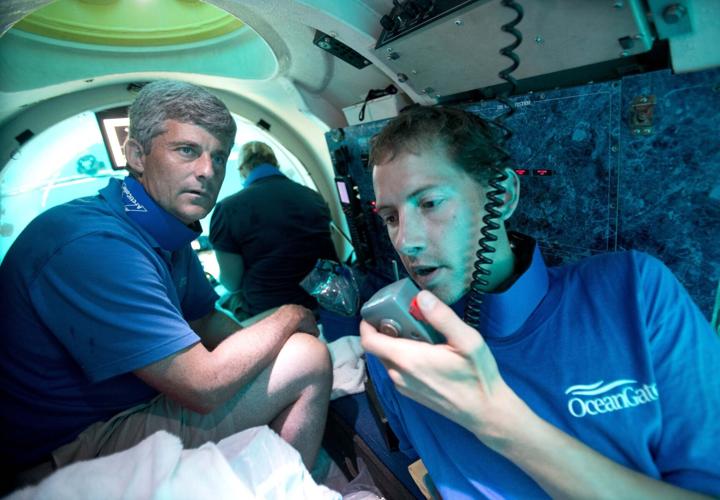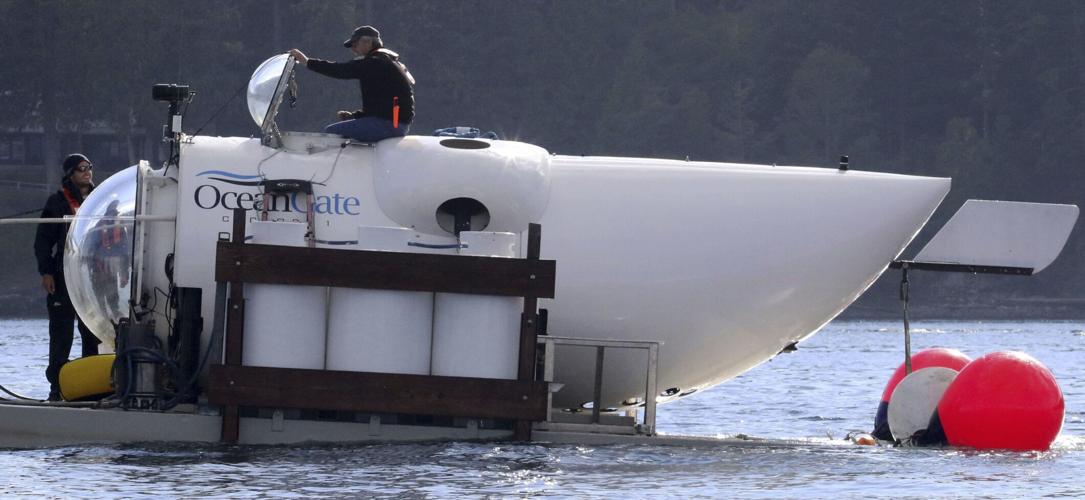EVERETT, Wash. — As other entrepreneurs push the edges of technology to bring well-heeled tourists to space, Stockton Rush saw new opportunities for exploring another frontier: the deep sea.
OceanGate, the company he founded in 2009, sought not just to profit from bringing wealthy adventurers to sites such as the wreck of the Titanic, but to help scientists and researchers unravel oceanic mysteries by giving them better access to the sea floor than ever before — in vessels that would break the boundaries of how submersibles are developed.

Submersible pilot Randy Holt, right, communicates with the support boat as he and Stockton Rush, CEO and co-founder of OceanGate, dive in the company’s submersible, Antipodes, off the coast of Fort Lauderdale, Fla., on June 28, 2013.
“One of the reasons I started the business was because I didn’t understand why we were spending 1,000 times as much money to explore space as we were to explore … the oceans,” Rush told a conference held by GeekWire, a Seattle tech news website, last year. “There is no private access to the deep ocean, and yet there’s all this life to be discovered.”
OceanGate's novel submersible Titan was reported overdue Sunday night off Newfoundland, with Rush and four others onboard, spurring a desperate international search. The U.S. Coast Guard and OceanGate said Thursday that the missing submersible imploded near the wreckage of the Titanic, killing all five people on board.
It was the company's third annual expedition to the Titanic, which struck an iceberg and sank in 1912, killing all but about 700 of the roughly 2,200 passengers and crew.
Rush, a former test flight engineer for McDonnell Douglas' F-15 fighter jet program, had long experience in aerospace and aviation, as well as technology startups by the time he founded OceanGate, according to the company’s website.
Before graduating from Princeton University with a degree in aerospace engineering in 1984 and obtaining a master's degree in business administration from the University of California in 1989, Rush obtained his captain's rating at the United Airlines Jet Training Institute. He went on to oversee business ventures that included serving on the board of Seattle's BlueView Technologies and as chairman of Remote Control Technology.
Rush saw a way to use advances in materials sciences to craft a new type of sub — one that would be oblong, rather than spherical, and made with carbon fiber, which he said had a better strength-to-buoyancy ratio than titanium. The design would carry five people and would give scientists and deep-sea adventurers alike more room — the few privately owned subs in the world could only carry two or three people at most.
Most research subs also required huge support ships and were not meant to be cost-effective, Rush said. Part of the idea behind OceanGate was to offset the cost of deep-sea research through high-end adventure tourism, exploration or mapping for the oil and gas industry, or inspection of bridges or ship hulls.
He and other investors poured tens of millions of dollars into OceanGate, based at an industrial marine park in Everett, Washington, close to Boeing’s factory and aerospace firms with expertise in using titanium and carbon fiber.

OceanGate CEO Stockton Rush emerges from the hatch atop the OceanGate submarine Cyclops 1 in the San Juan Islands, Wash., on Sept. 12, 2018.
OceanGate acquired its first submersible in 2009 and a second in 2012, which it rebuilt into the Cyclops 1 — a working prototype for the Titan that can descend 1,640 feet. Cyclops 1 has been on dozens of training and research dives — including a trip in Puget Sound with the hip-hop artist Macklemore to look for elusive six-gill sharks — that helped inform the development of the Titan.
In September 2018, Rush piloted Cyclops 1 on an expedition in Washington's San Juan Islands with researchers and scientists. The expedition included seven dives over five days to observe the feeding strategies of deep-sea red urchins, document the habitat of Pacific sand lances, and assess possible impacts of scientific trawling on the ecosystem.
In a Facebook post Tuesday, the conservation group SeaDoc Society, which funded the expedition, said the research “would not have been possible without OceanGate’s submersible technology and their professional team.”
Alex Lowe, a University of Washington graduate student, recalled in a video published on OceanGate’s website his amazement at how, just six minutes into their dive, he and others onboard saw red urchins at 931.7 feet deep — more than twice the depth at which they had ever been observed before.
“There was mission accomplished in six minutes," Lowe said.
The company’s charitable arm, the OceanGate Foundation, provided support for deep-sea exploration, marine science research and nautical archeology. After scuba divers in 2016 discovered remnants of an ancient Roman merchant ship off Israel, OceanGate facilitated the testing of prototype 3D mapping robots that produced images for a virtual reality experience of the shipwreck site.
Greg Stone, the former executive vice president and chief scientist for Conservation International as well as a friend of Rush, said there is a need for advances in research submersibles.
“That’s the direction he was going in. And I liked where he was going,” Stone said.
But, he added, Rush “had the problem that a lot of frontier people have. And that is he was ahead of the regulations.”
In a 2018 letter, the Marine Technology Society, a professional group of ocean engineers, technologists, policymakers and educators, complained to Rush that OceanGate should submit its prototype to tests overseen by an expert third party before launching in order to safeguard passengers.
“One of the things I learned is when you're outside the box, it's really hard to tell how far outside the box you are,” Rush said in the speech last year. “We were pretty far out there.”
Psychologist describes likely experience on missing Titanic sub, and more of today's top videos
A former Navy psychologist offered chilling insight into the possible state-of-minds of the people aboard the missing Titanic sub, how France is compensating victims of pollution, and more of today's top videos.
A former Navy psychologist offered chilling insight into the possible state-of-minds of the five people aboard the missing Titanic sub.
Time is running out as the sub's passengers deplete their oxygen supply. Rescuers face myriad challenges in finding the craft over an area big…
It is a legal verdict with no former precedent that could pave the way for future cases: in a first for France, the Paris Administrative Cour…
The longest day of the year, otherwise known as the summer solstice, has fallen on June 21, marking the astronomical start to the season.
In Ghana, dozens of full sea containers with discarded clothing arrive every week. But a local designer is trying to tackle the mountains of u…
Scientists have made significant progress in identifying the cause of severe morning sickness in pregnant women.














